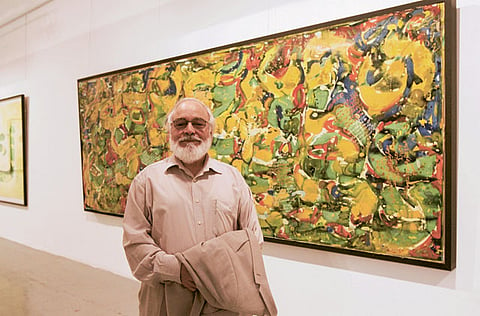Artist who introduced Arabic lettering, language on canvas
In the beginning I was looking at how to express our own culture and civilisation without following the western schools of art, says Ermes

Dubai: At first glance Ali Omar Ermes doesn't evoke a sense of rebellion or mutiny. His stout build and warm smile instills in you a feeling of security, a compassionate fatherly-figure who wishes to take you by the hand and reveal to you the simple wonders of his art and message.
Yet Ermes was one of the first artists to introduce Arabic lettering, language and etymology into art pieces. When Middle Eastern artists were running after Western ideals to either emulate great western artists of the time or to appeal to the western art scene, Ermes stood strongly against such acts.
The work he displayed in his gallery today is greatly similar to his earlier work which he displayed in 1969 in Plymouth City Museum and Art Gallery in the UK, which at the time was the first if its kind.
"In the beginning I was looking at how we were going to bring a new form of expression, to take our own culture and civilization as a premium power of expression, not just follow western schools of art," Ermes told Gulf News during an Interview at Meem gallery where his solo exhibition "Ali Omar Ermes: Recent Works" is displayed.
Calligraphers
Ermes doesn't describe himself as a calligrapher, or a professional in the art of Arabic calligraphy. His mode of expression differs from the strict discipline displayed by professional calligraphers who practice a centuries-old form of art.
"I haven't been trained as a calligrapher neither what I do goes with the regulations of calligraphy. What I use is the script itself to explore the power of expression of the Arabic script, to bring about a space where the Arabic script can be used in a way to show the beauty, concept and depth of heritage in the Arabic script and to allow this language in its visual form to be seen around the world," said Ermes.
Ermes who was born in Libya in 1945 separated himself from the crowds from an early age to follow what he believed as innovation rather than imitation. Although his artwork strictly displays Arabic script and poetry, Ermes believes that the artwork can be enjoyed and understood by all cultures.
"The Arabic script doesn't speak for only Arabs; Arabic speaks for the whole of humanity. It is the custodian of the most important human thoughts. Arabic was and still is the inheritor of all civilizations and religions that were founded in the Middle East, the Arabic language was the medium for those lost civilizations," said Ermes.
In order to epitomize this ideal, Ermes painted a 4 feet painting titled "Peace means Justice", which displayed the phrase ‘Implement justice in the world and you gain peace on earth' in 23 different languages both ancient and modern such as Russian, Latin, Turkish, Sanskrit, Bengali and Chinese.
"The idea behind this piece was to send this message through all languages to different parts of the world and to say that even though the idea is simple and known to many, some people are still capable of ignoring what is right and what is obvious," explained Ermes.
Ermes who is a public speaker about different subjects such as identity, education, human rights and art also condemns the bohemian lifestyle adopted by many artists which was transferred from the west as a trend.
Ermes believes that an artist shouldn't be removed from society, but should identify with everything and everyone around him in order to be a complete human being and a productive artist.
Part of society
"I don't devote all my time to my art [he chuckles], there are other things which I feel that humans need to do. You are a father; husband, brother, uncle, neighbour, a friend, part of community, part of society, and part of the world. If you started dissolving everything else and identified only as a person who does art, you reach to a very poor state of affairs. You are a full human being who is part of society and has responsibilities and interest in many other areas other than art," said Ermes.
Other than being an artist whose work is displayed in many international galleries such as the British Museum, National Gallery of Malaysia in Kuala Lumpur and Tate Britain in London, Ermes is a prolific writer who contributed to both Arabic and English Publications in various subjects regarding culture and art.
Ali Omar Ermes' solo work is on display in Meem Gallery where it will continue to be displayed until January 27, 2011.



